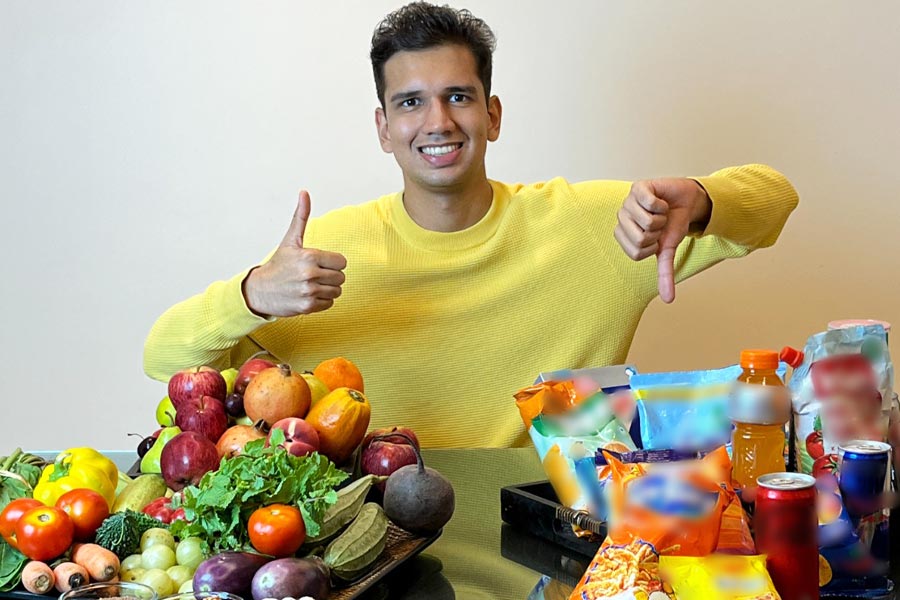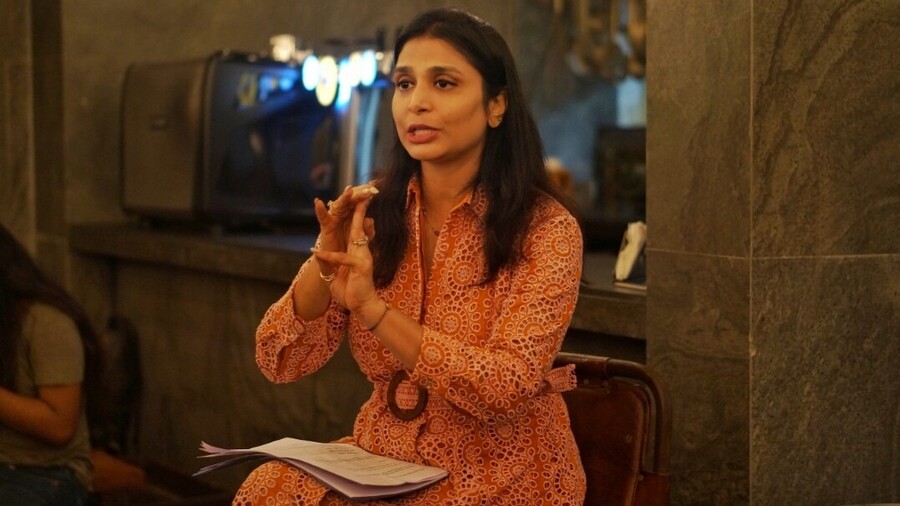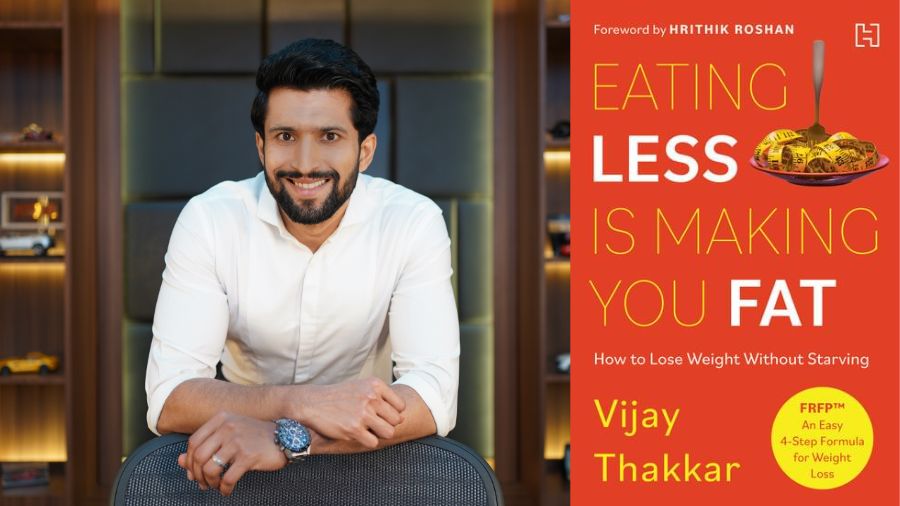Until April 2023, Revant Himatsingka was engaged in a high-profile finance job in the United States.
In the last eight months, he has created a nutrition movement, pushing a popular health drinks brand and instant noodles brand to reduce sugar in their products. He has also received five lawsuits from four brands. Throughout the process, he has been informing his 1.4M-strong follower base on Instagram how to make clean eating choices, all with a healthy dose of humour.
While the internet knows him for debunking food myths with humour, Revant is much more. My Kolkata caught up with the Kolkata boy to talk about his clean eating and more.
Beginnings of a tryst with healthy eating
When asked about his early years at Kolkata’s Don Bosco Park Circus, he remembers being ‘a skinny kid who got bullied.’ He also remembers eating a lot of junk food. “I used to love packaged food from all the companies that I make videos about today. The first thing we think about is taste, followed by price. We don’t consider calories, protein or sugar,” said Revant. His tryst with healthy eating began when he went to the US for higher studies. It was there that he realised the role of marketing in the perception of ‘healthy food’. Later, when he was working, many of his consulting clients were the very companies that he makes videos about today.
“Ninety-nine per cent of people are not health conscious. Even the other one percent are consuming harmful things, believing them to be healthy. I would see people having energy drinks at the gym or with their morning milk,” he recalled. Revant credits his then-girlfriend and now wife with cementing his interest in nutrition. Eventually, he ended up doing a year-long course on the subject. A key takeaway was how almost 70 per cent of what we eat today is packaged. He was then faced with another big question: In a world where every packaged item claims to be healthy, how do you differentiate? This thought sowed the seeds for Food Pharmer. “I realised that if people learn how to read a food label, they can easily determine what is healthy and what isn’t. Today, learning to read a food label is a more important life skill than coding.”
From writing to social impact
While he took up a job in finance, Revant’s mind remained in the social impact space. This prompted him to turn author at 22, with his book, Selfienomics. The book examines every major aspect of life, including finance, religion, death and health, with humour. “At my then-job, every entertainment website was blocked. During breaks, I would Google really random things,” he said, when talking about writing the book. This brought him to the realisation that people are very particular about the small things in life, but don’t give the same thought to the big things. “We will spend hours debating about what to order, but choose a vegetarian or non vegetarian diet because of how our parents brought us up. We will read five reviews before buying tickets to a movie, but follow a religion just because our parents follow it. I examined all these aspects of our lives, but with humour.”
While writing the chapter on health, he kept going back to one problem statement: What is the fastest way to make 1.4 billion Indians healthier? That’s when his nutrition background came back to him. “If I could clean up the packaged food industry, I could solve one of the biggest problems in life. The solution was to make India nutritionally literate.”
Post Selfienomics, Revant spoke at many educational institutes and TEDx events. He also started making videos on social media to promote the book, completely disconnected from the videos he makes today. “My early videos mostly had jokes on Alipore guys and people from La Martiniere. This taught me how to get audience attention, and when I finally started my Food Pharmer journey, I would always think about retaining the viewer’s attention. I now have an influencer marketing brain examining every line I use on camera.”
The economics of going viral
After completing his MBA from The Wharton School, he continued working as a consultant to pay the bills, but his thoughts were fixed on cleaning up the packaged food industry. In April 2023, he quit his high-paying job in the US, and came back to Kolkata. “I was making great money, and had been living in the US for 13 years, so it wasn’t easy to leave. But I believed that if I came back to India, raised awareness and added enough value, I would find a way to make money too. I was genuinely interested in making a change.”
On April 1 last year, he posted a video about Bournvita’s sugar content, and the impact its consumption could have on children. At the time, he had just 1,000 followers on Instagram. Within hours, he got a legal notice from the brand, and had to take the video down. However, by then, it was being circulated on WhatsApp groups, and Revant was being discussed on all major TV news channels. His video was trending in the top spot on X (Twitter) for three days. By April 9, he had over 100,000 followers. All from one video.
The coming months saw him dropping more videos about nutrition. Within six months, Revant had hit a million followers on Instagram. “While the Bournvita video got a meteoric rise, I am largely relevant because I didn’t monetise it. I got offers from every single company to advertise their products, and I said no to insane amounts of money. If I had done just one Bournvita video, people would have forgotten me. But I kept at it, and the second, third, fourth and fifth video also went viral. It’s been nine months, and the videos are still getting millions of views,” he smiled.
What stands out about his advice is how actionable it is. He gave us an example with a cookie packet. “This packet says ‘cashew almond cookies’. Don’t just look at the front of the packaging, it is just marketing. The honest truth lies at the back, where people normally only look at the MRP and expiry date. I advise people to check the ingredient list, which is listed in the order of the weight. If the first five ingredients have sugar, maida or palm oil, try to avoid it. When you see the packaging, you might assume that this cookie is made of nuts, but they are the fourth ingredient, with just 1.4 per cent almonds and 0.4 per cent cashews.” Revant’s philosophy is to tell the truth as is, without any jargon. “When I see a product with four grams of sugar, I simplify it by saying that it has one teaspoon. Even when I make a health claim, it has to be backed by a research report, or a doctor.”
In the past months, Revant’s social media persona has spawned a movement, with thousands showing love in the comments section, and demanding better products from MNCs. Much of his growth can be attributed to his humour. He isn’t droning on about complicated numbers on a microphone. He is making jokes about Munnabhai. “I spend a lot of time observing people’s behaviour. I don’t read an article with as much attention as I read comments, just to grasp what everyone is thinking. I may read about Peter Singer’s take on hedonism, and then watch a film review by Kamaal R. Khan. Both sides are a part of me, and come through in my videos.”
Things haven’t always been smooth sailing though. Since he took on the Food Pharmer alias, Revant has been contacted by every stakeholder in the food vertical, from nutrition bodies to activists, and even politicians. “I’ve had people comparing me to freedom fighters, and on the other side, I’ve received calls from politicians, asking me to push a certain agenda. People are asking me to speak at their schools, and startups are asking me to promote their products. Everyone has differing opinions, and they constantly tell me, ispe video banao, uspe video mat banao (make a video on this topic, don’t make one on that). I don’t know how I stay sane under the constant pressure.”
Homecoming with a purpose
As time passed, he realised that this space is a wide spectrum. On one side, brands are making huge investments based on certification by international bodies. On the other hand, there are NGOs working at the grassroot level, trying to solve the food crisis. Revant confesses that the weight of his work does scare him at times. “If people give up packaged food and start eating fruits and vegetables, farmers will benefit while middle men will be cut out. When you hurt so many pockets, a lot of politics comes into play. This isn’t an issue that can be solved on social media. You need to dedicate your life to it.”
The pressure gets amplified because he doesn’t have a team. Revant scripts and shoots all the Food Pharmer videos by himself, only hiring help from a part-time video editor. “Regardless of how busy I am, I want one or two videos to come out every week.”
The impact of this pressure percolates to his family too. “Thankfully I have a lot of public support. But you know how a Kolkata Marwari family is. I always get, ‘Yeh video wagera toh theek hai, par tum karte kya ho?’ (Making videos is fine, but what is your job?) I don’t blame them. Within two weeks of coming back to India, I had five legal notices and no job. Very few friends called to check up on me. It is not a joke. And what I am doing doesn’t just have a financial risk. They are also worried about the legal and potential physical threats. In the midst of all this, my wife has been working in the US, and we’ve been long-distancing over the last nine months.”
Apart from virality, his movement has led to many experts backing his videos, several companies reducing sugar content in their products, and marketeers changing taglines. His vision is locked onto the long term. “Right now, I have just won a few mini battles. But one wrong statement, and it’s very easy to lose credibility. At some point, maybe two years, five years or 10 years down the line, things may not be as smooth as they are today. I may make mistakes. My only request to the people is to support me when things are not going well.”
Revant’s support has gone beyond the comment section, with people not only offering pro-bono legal representation, but hundreds willing to donate to his cause. He hasn’t monetised the Food Pharmer movement yet, and is operating on his savings from the US. While his dreams are big, for now, true to the comic element of his videos, Revant’s struggles begin at home. He’s struggling to get his family to eat clean. “I constantly tell them, if I’m making these videos, atleast mere ghar pe toh follow hona chahiye (it should at least be followed in my own home),” he signed off, chuckling.


